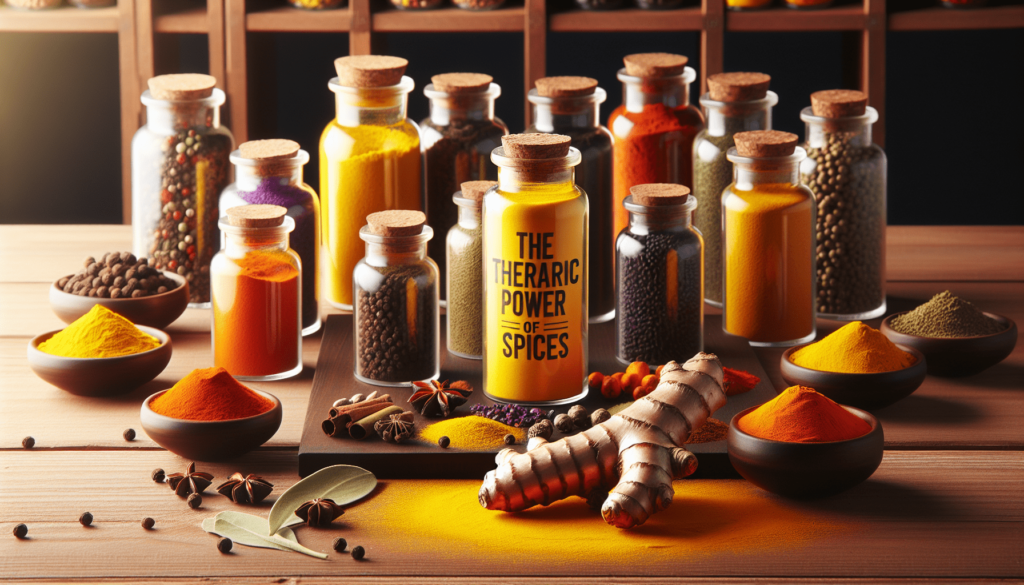Are you curious about the potential benefits of spices in reducing inflammation in the gut? Inflammation in the gut can lead to discomfort and various digestive issues, but could the answer lie in our very own spice racks? This article explores the connection between spices and gut health, examining whether certain spices have anti-inflammatory properties that could provide relief and promote a healthier digestive system. Get ready to discover the potential power of these flavorful ingredients in soothing your gut.

Spices and Inflammation
Inflammation in the Gut:
Inflammation in the gut is a common problem that can lead to various gastrointestinal disorders. It occurs when the body’s immune system responds to harmful stimuli, such as toxins or pathogens, by releasing inflammatory mediators. Chronic inflammation in the gut can have a negative impact on overall health and well-being. It can contribute to the development of conditions such as leaky gut syndrome, irritable bowel syndrome (IBS), and inflammatory bowel disease (IBD). Finding natural ways to reduce gut inflammation is essential for maintaining a healthy digestive system.
Role of Spices in Inflammation:
Spices have been used for centuries as flavor enhancers in various cuisines. But did you know that many spices also possess anti-inflammatory properties? Several studies have highlighted the potential of spices in reducing inflammation and promoting gut health. These natural remedies can have a positive impact on the body’s immune response and help alleviate symptoms associated with gut inflammation.
Anti-Inflammatory Properties of Spices
Curcumin in Turmeric:
One of the most well-known spices with potent anti-inflammatory properties is turmeric, thanks to its active compound called curcumin. Curcumin has been extensively researched for its ability to reduce inflammation in the gut. It inhibits the production of pro-inflammatory cytokines, which are molecules that contribute to inflammation. Regular consumption of turmeric can help alleviate symptoms of gut inflammation and promote overall digestive health.
Cinnamon:
Cinnamon is not just a popular spice for adding flavor to your baked goods; it also possesses anti-inflammatory effects. Its active compounds, such as cinnamaldehyde, have been shown to reduce the levels of pro-inflammatory markers in the body. Incorporating cinnamon into your diet can help combat gut inflammation and improve digestive function.
Ginger:
Ginger is a versatile spice that is commonly used in cooking and traditional medicine. It contains gingerol, a bioactive compound known for its anti-inflammatory properties. Gingerol has been shown to inhibit the production of pro-inflammatory cytokines and reduce gut inflammation. Adding ginger to your meals or enjoying a cup of ginger tea can be beneficial for gut health.
Cloves:
Cloves are not just fragrant; they also offer anti-inflammatory benefits. Clove extract has been found to inhibit the release of inflammatory mediators, thus reducing gut inflammation. Incorporating cloves into your cooking or consuming clove tea can help soothe your gut and promote digestive well-being.
Garlic:
Garlic is widely used in various cuisines for its unique flavor. It also contains sulfur compounds, such as allicin, that possess anti-inflammatory properties. These compounds have been shown to reduce inflammation in the gut by inhibiting the production of pro-inflammatory molecules. Consuming garlic regularly can help maintain a healthy gut and support overall digestive health.
Cayenne Pepper:
The fiery cayenne pepper not only adds a kick to your dishes but also offers anti-inflammatory benefits. Capsaicin, the active compound in cayenne pepper, has been found to reduce the production of inflammatory substances. Incorporating cayenne pepper into your diet can help alleviate gut inflammation and promote optimal digestive function.
Coriander:
Coriander, also known as cilantro, is a herb commonly used in various cuisines. It contains antioxidants and bioactive compounds that possess anti-inflammatory properties. These compounds have been shown to reduce the levels of pro-inflammatory cytokines in the body. Adding coriander to your meals can provide a flavorful way to combat gut inflammation and support digestive health.
Fennel:
Fennel seeds have long been used as a digestive aid due to their anti-inflammatory properties. The active compounds in fennel seeds have been found to reduce the production of inflammatory chemicals in the gut. Consuming fennel seeds or fennel tea can help soothe gut inflammation and promote healthy digestion.
Black Pepper:
Black pepper is a staple spice in many households. It contains a compound called piperine, which has been shown to have anti-inflammatory effects. Piperine inhibits the production of inflammatory mediators in the body, thus reducing gut inflammation. Adding black pepper to your meals can enhance the flavors while providing potential benefits for gut health.
Mechanisms of Action
Reducing Pro-Inflammatory Cytokines:
One of the key mechanisms by which spices reduce gut inflammation is by inhibiting the production of pro-inflammatory cytokines. These molecules play a significant role in promoting inflammation in the gut. Spices such as turmeric, cinnamon, ginger, cloves, garlic, cayenne pepper, coriander, fennel, and black pepper have been found to suppress the release of pro-inflammatory cytokines, thereby helping to alleviate gut inflammation.
Antioxidant Activity:
Another mechanism through which spices exert their anti-inflammatory effects is by their antioxidant activity. Oxidative stress, caused by an imbalance between reactive oxygen species (ROS) and antioxidants in the body, can contribute to gut inflammation. Spices rich in antioxidants, such as turmeric, cinnamon, ginger, cloves, garlic, cayenne pepper, coriander, fennel, and black pepper, help neutralize ROS and reduce oxidative stress, thereby alleviating gut inflammation.
Modulating Gut Microbiota:
The gut microbiota, which consists of trillions of microorganisms residing in the gastrointestinal tract, plays a crucial role in gut health. Imbalances in the gut microbiota can contribute to gut inflammation. Certain spices, such as turmeric, cinnamon, ginger, cloves, garlic, cayenne pepper, coriander, and fennel, have been found to have antimicrobial properties and can help maintain a healthy balance of beneficial bacteria in the gut. This, in turn, reduces inflammation and promotes optimal digestive function.
Scientific Evidence
Animal Studies:
Numerous animal studies have explored the anti-inflammatory effects of spices on gut health. These studies have consistently shown that spices such as turmeric, cinnamon, ginger, cloves, garlic, cayenne pepper, coriander, fennel, and black pepper can reduce gut inflammation and improve overall gastrointestinal function in various animal models. These findings highlight the potential of spices as natural remedies for gut inflammation.
Cell Studies:
In-vitro cell studies have provided further evidence of the anti-inflammatory properties of spices. These studies have demonstrated that the bioactive compounds present in turmeric, cinnamon, ginger, cloves, garlic, cayenne pepper, coriander, fennel, and black pepper can inhibit the production of pro-inflammatory cytokines and reduce gut inflammation at a cellular level. These findings support the use of spices as potential therapeutic agents for gut inflammation.
Human Studies:
While the majority of research on spices and gut inflammation has been conducted in animal models or cell cultures, some human studies have also been conducted. These studies have shown promising results, indicating that the regular consumption of spices such as turmeric, cinnamon, ginger, cloves, garlic, cayenne pepper, coriander, fennel, and black pepper can reduce gut inflammation and improve symptoms in individuals with gastrointestinal disorders. However, more well-designed human studies are needed to further validate these findings.

Spices and Gut Health
Leaky Gut Syndrome:
Leaky gut syndrome, also known as increased intestinal permeability, is a condition characterized by the presence of gaps in the lining of the intestines. These gaps allow toxins, bacteria, and undigested food particles to leak into the bloodstream, triggering an immune response and leading to inflammation. Spices with anti-inflammatory properties, such as turmeric, cinnamon, ginger, cloves, garlic, cayenne pepper, coriander, fennel, and black pepper, can help reduce gut inflammation and support the healing of leaky gut syndrome.
Irritable Bowel Syndrome:
Irritable bowel syndrome (IBS) is a common gastrointestinal disorder characterized by abdominal pain, bloating, and changes in bowel habits. It is often associated with gut inflammation. Incorporating spices into the diet can help alleviate symptoms of IBS by reducing gut inflammation and promoting healthy digestion. Spices such as turmeric, cinnamon, ginger, cloves, garlic, cayenne pepper, coriander, fennel, and black pepper can provide natural relief for individuals with IBS.
Inflammatory Bowel Disease:
Inflammatory bowel disease (IBD) encompasses conditions such as Crohn’s disease and ulcerative colitis, which are characterized by chronic inflammation in the digestive tract. Spices with anti-inflammatory properties can play a complementary role in the management of IBD by reducing gut inflammation and improving symptoms. Regular consumption of spices such as turmeric, cinnamon, ginger, cloves, garlic, cayenne pepper, coriander, fennel, and black pepper can support conventional treatment and help individuals with IBD achieve better digestive health.
Gastrointestinal Disorders:
Spices can also be beneficial for individuals with other gastrointestinal disorders, such as gastritis, gastroesophageal reflux disease (GERD), and peptic ulcers. These conditions often involve gut inflammation and can cause discomfort and digestive disturbances. Incorporating spices into the diet can help reduce gut inflammation, soothe the digestive system, and improve symptoms associated with these disorders.
Spices as Complementary Treatment
Supporting Conventional Treatment:
Spices with anti-inflammatory properties can serve as valuable complementary treatments to conventional therapies for gut inflammation and gastrointestinal disorders. While medications prescribed by healthcare professionals are crucial for managing these conditions, incorporating spices like turmeric, cinnamon, ginger, cloves, garlic, cayenne pepper, coriander, fennel, and black pepper can enhance the therapeutic effects and provide additional relief.
Reducing Symptoms:
Spices can help reduce the symptoms associated with gut inflammation and gastrointestinal disorders. The anti-inflammatory properties of spices can alleviate abdominal pain, bloating, cramping, and other discomforts commonly experienced by individuals with these conditions. Regular consumption of spices can provide natural relief and improve overall digestive well-being.
Preventing Recurrence:
In addition to reducing symptoms, spices can also help prevent the recurrence of gut inflammation and gastrointestinal disorders. The anti-inflammatory effects of spices on the gut can help maintain a healthy digestive system and minimize the risk of flare-ups. By incorporating spices into your diet, you can support long-term gut health and reduce the likelihood of recurrent inflammation.
Incorporating Spices in Your Diet
Cooking with Spices:
One of the simplest ways to incorporate spices into your diet is by cooking with them. Many spices, such as turmeric, cinnamon, ginger, cloves, garlic, cayenne pepper, coriander, fennel, and black pepper, can be added to various dishes to enhance their flavor and provide anti-inflammatory benefits. Experimenting with different spice combinations can add depth and complexity to your meals while supporting your gut health.
Creating Spice Blends:
Creating spice blends is another creative way to incorporate spices into your diet. You can combine multiple spices, such as turmeric, cinnamon, ginger, cloves, garlic, cayenne pepper, coriander, fennel, and black pepper, to create unique and flavorful blends that can be used in marinades, rubs, and sauces. Homemade spice blends allow you to customize the flavors according to your preferences while reaping the benefits of the anti-inflammatory properties of spices.
Teas and Infusions:
Spices can also be enjoyed as teas and infusions. Boiling spices in water and steeping them to create flavorful beverages is a soothing and refreshing way to include spices in your daily routine. Turmeric, ginger, cinnamon, cloves, and fennel are popular choices for teas and infusions that can help reduce gut inflammation and promote digestive health.
Precautions and Considerations
Dosage and Frequency:
While spices offer numerous health benefits, it is essential to exercise caution in their consumption. Some spices, such as turmeric, cinnamon, and cayenne pepper, can be potent in high doses. It’s important to follow recommended guidelines and consume spices in moderation. Consult with a healthcare professional or a registered dietitian to determine the appropriate dosage and frequency for your specific needs.
Possible Interactions:
Certain spices may interact with medications or medical conditions. For example, turmeric may interfere with blood clotting medications, while ginger may interact with blood pressure medications. If you have any underlying medical conditions or are taking medications, it is important to consult with a healthcare professional before incorporating spices into your diet to ensure there are no adverse interactions.
Individual Sensitivities:
Individual sensitivity to spices can vary. Some individuals may experience allergic reactions or digestive discomfort when consuming certain spices. It is important to listen to your body and pay attention to any adverse reactions. If you experience any allergic symptoms or digestive disturbances after consuming spices, it is best to discontinue their use and consult with a healthcare professional.
Consulting with a Healthcare Professional
Seeking Expert Advice:
If you are considering incorporating spices into your diet for gut health, it is advisable to seek expert advice. Consulting with a healthcare professional or a registered dietitian can provide personalized guidance based on your specific needs and health conditions. They can help determine the appropriate spices, dosage, and frequency to support your gut health and overall well-being.
Personalized Recommendations:
A healthcare professional or a registered dietitian can provide personalized recommendations tailored to your individual needs. They can assess your medical history, dietary preferences, and overall health to create a comprehensive plan that incorporates spices to reduce gut inflammation and improve digestive health. This personalized approach ensures the most effective and safe use of spices for your specific circumstances.
Conclusion
Spices have long been valued for their ability to enhance the flavors of our meals. However, their potential as anti-inflammatory agents and their impact on gut health should not be overlooked. Incorporating spices such as turmeric, cinnamon, ginger, cloves, garlic, cayenne pepper, coriander, fennel, and black pepper into your diet can provide natural relief for gut inflammation and improve overall digestive health. While further research is needed, the existing scientific evidence supports the use of these spices as potential therapeutic agents for gut inflammation. By consulting with a healthcare professional and incorporating spices in moderation, you can harness the potential of these natural remedies and support your gut health for optimal well-being.

